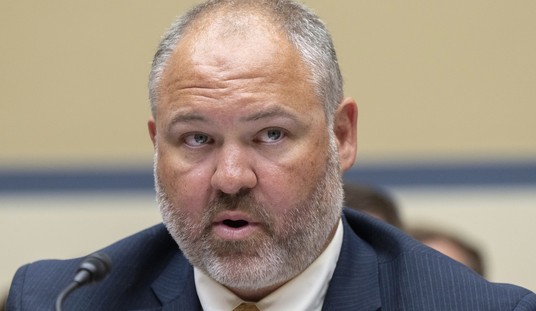He certainly pulled out all stops to avoid going to prison in the first place. Now Michael Cohen wants to use the coronavirus pandemic to get out of his three-year sentence early. In a letter to a federal judge yesterday, his attorney argued that the Bureau of Prisons could not prevent the amplification of the coronavirus pandemic through its population, and therefore Cohen should work from home instead, so to speak:
Michael Cohen, President Donald Trump’s former lawyer and fixer, is requesting to serve the remainder of his three-year prison sentence at home due to unsafe prison conditions caused by the coronavirus outbreak.
In a letter to District Judge William Pauley for the Southern District of New York on Tuesday, Roger Bennet Adler, Cohen’s attorney, argued that Cohen’s sentence should be modified “as a consequence of the Bureau of Prison being demonstrably incapable of safeguarding and treating B.O.P. inmates who are obliged to live in close quarters and are at an enhanced risk of catching coronavirus.” …
In his letter to the judge, Cohen’s lawyer attached blog posts and articles highlighting hygiene concerns and pointing to other states that have recently taken steps to shrink their prison population in order to protect inmates and those who work in prisons from the deadly outbreak.
The Los Angeles county sheriff, for example, is releasing people from prison early and is asking officers to cite and release people when possible, instead of arresting them.
That last point seems inaccurate, although that might just be careless reporting from NBC News rather than an error by Cohen’s attorney. A sheriff does not have the authority to release inmates from prisons early, not once they have been sentenced in court. Sheriffs generally control jails, where minor sentences are served and defendants held before trial. Los Angeles County Sheriff Alex Villanueva is indeed taking the actions cited at its jails and with its deputies, which is as far as his writ runs, although Victoria Taft is not happy about it at all. Why, she wonders, isn’t the sheriff more concerned about “socially distancing” criminals from law-abiding citizens?
The jail officials are testing the inmates for the flu and coronavirus. The sheriff says that no inmates have tested positive for COVID-19.
Villanueva proudly announced that he’s freed 600 inmates and ordered local cops to reduce their arrests. He said they’ve cut their arrests by 80%, from 300 per day to 60.
Maybe that’s why residents are buying a record number of guns, Everclear and weed.
Nevertheless, those actions are within his authority as sheriff. Sheriffs can and sometimes do institute release programs to deal with overcrowding in jails, but prisons are under the control of the state, including in California. Cohen isn’t in jail — he’s in prison, sentenced there by a federal judge. Even if Cohen’s attorney was more precise in his argument about jails rather than prisons, the latter are meant for more serious crimes … like perjury before Congress and obstruction of justice.
Nevertheless, Cohen’s not the only inmate using the COVID-19 outbreak to break out. An attorney for a death-row inmate in Texas successfully argued in an appellate court for a delay in his execution because it might be unhygienic and amplify the spread of the disease. The Associated Press reports this morning on a kind of cottage industry in coronavirus pleadings for clemency or temporary release. Even Bernie Madoff is getting into the act:
Coronavirus has become a “get out of jail” card for hundreds of low-level inmates across the country, and even hard-timers are seeking their freedom with the argument that it’s not a matter of if but when the deadly illness sweeps through tightly packed populations behind bars.
Among those pleading for compassionate release or home detention are the former head of the Cali drug cartel, President Donald Trump’s former personal attorney Michael Cohen, Ponzi schemer Bernard Madoff and dozens of inmates at New York City’s Rikers Island, part of a jail system that lost an employee to the virus this week.
“He is in poor health. He is 81 years old,” David Markus, the attorney for cocaine kingpin Gilberto Rodriguez-Orejuela, wrote in emergency court papers this week seeking his release after serving about half of a 30-year drug-trafficking sentence. “When (not if) COVID-19 hits his prison, he will not have much of a chance.”
Even beyond the need to impose justice on prisoners, there are a couple of other problems with this argument. First, we have no idea whether these prisoners already have COVID-19. If they do, they should “shelter in place” anyway, not be released into the public. Even if they don’t at the moment, are we to trust that they will abide by a lockdown order at home? Let’s not forget that they went to prison in the first place for defying the law, sometimes on a spectacular scale, such as Madoff and Rodriguez-Orejuela.
And for that matter, our law enforcement and other first responders are already under enough stress during this outbreak. Is this really the time to open the prisons and let criminals walk free on the off chance they’ll abide by the law now? Even if they all wear ankle bracelets, police will have to track down and enforce any violations, which will spread them even thinner to handle the issues that will erupt in the Great Hunkering Down.
Sheriffs and judges should use significant discretion about sending people to jails for non-violent minor offenses and for holding them over minor issues before trial, at least for the next few weeks. Prisons should clean up their facilities and do their best to prevent the spread of the disease, but those who have been sentenced to prison should remain in place, including Michael Cohen. Judges should give their “get out of jail free” COVID-19 briefs with as much seriousness as they’d use if someone sent them a Monopoly card in the mail.









